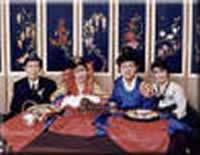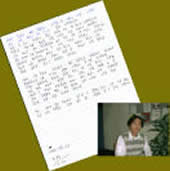|
Sookan Bak came from Korea to attend college in the
United States. Her days are so busy, sookan hardly was time
to write home. Her mother's first letter arrives.
I stared at the unopened letter from Mother. It felt strange
to see my own handwriting on the envelope. The  night
before I left Seoul, I had stayed up al night attending
to last-minute details. One of these was to stamp and address
twenty envelopes to myself. Mother did not know English,
and I wanted her to feel free to write me without having
to ask my brothers to address the envelopes for her. I know
how Mother hated imposing on her children. She always said
that young people have their own worries, and that her job
was to see that her children had the time to live their
own lives. night
before I left Seoul, I had stayed up al night attending
to last-minute details. One of these was to stamp and address
twenty envelopes to myself. Mother did not know English,
and I wanted her to feel free to write me without having
to ask my brothers to address the envelopes for her. I know
how Mother hated imposing on her children. She always said
that young people have their own worries, and that her job
was to see that her children had the time to live their
own lives.
She was very different from the other mothers I knew.
She never talked of filial
duty, of the obligations we had to our elders and our ancestors.
One of Mother's favorite sayings was "Just as water
runs down, so does love." She felt responsible for
setting a good example, and just as she loved us, she expected
us to love each other, and our children.
She never complained about her hardships, and instead
said, "One cannot live looking up. One must look down
to those less fortunate and must help them. One has to appreciate
what one has in life." With Father gone, she struggled
to make ends meet with the little money my brothers were
able to earn. And yet, she was always there to help those
less fortunate.
This flood of memories overwhelmed
me. I longed for my mother. I missed her quiet smile that
always seemed to fill me with strength. I felt guilty that
I was not by her side. I slowly opened her letter.
Dear Sookan,
It is midnight. Even your ducks are asleep by the pond.
They are big now, perhaps a little too big for our small
pond. They waddle
all around the yard, and sometimes follow men all the way
to the street. I can hear your brother snoring. They fall
asleep so quickly; it is the gift of youth.
I am wearing the sweater you insisted on finishing before
you left. How stubborn
you were to say up all night before that long trip. But
I do love it, and wear it all the time. It keeps me warm
on nights like tonight. The cool weather seems to be setting
in already, and in the evening, it is quite chilly here.
I wonder if we packed enough clothes for you if you are
warm enough in America.
I was in the greenhouse earlier, checking on my chrysanthemums.
They will be fluffy
and beautiful this season. When they are in full bloom,
I will cut some to give Father Lee for Sunday service. My
contribution each Sunday is so small that I thought of supplementing
it with my flowers. It will make me feel that I support
my church.
Your older brothers like to wear the thin cotton socks
you knit before you left. Inchun pulled out the vest
you made, and wore it yesterday. I think he was glad the
weather became cool enough for it. He looks so handsome
in vest; the light gray color you chose suits him so well.
It was a good thing you learned how to knit as that is one
of the things I never learned.
We all miss you. The house fells empty without you.
I read your postcards as soon as our good mailman brings
them. He is getting old now, and has been having more and
more trouble with his legs this year. Bu he knows how important
your letters are, and always brings them all the way op
to the house for me. I am so grateful to him that I offer
him a cup of tea every time he comes. He asked me to say
hello to you for him.
In the evening, when we are all together, we read your
postcards aloud. I am sorry we are not sending you any  money.
What little you had with you must have been gone long ago.
I think your brothers do not write because they have no
money to send you. For give this helpless mother who sends
her daughter so far away and cannot even mail a little pocket
money each month. money.
What little you had with you must have been gone long ago.
I think your brothers do not write because they have no
money to send you. For give this helpless mother who sends
her daughter so far away and cannot even mail a little pocket
money each month.
I am glad you like your new friends and college in America.
It must be hard to adjust to the new culture and the new
way of doing things. The language alone must cause you problems.
Although you sound so cheerful and happy, I can imagine
the difficulties you face. I will never know exactly what
they are, though. I know you do not tell me things because
you don't want to worry me.
I know you will blossom
there, though things may be difficult for you now. It is
always hard to be away from your homeland. The first year
is always the worst, I think. We are all fine. Don't worry
about anything here. And please make sure to get enough
sleep.
You will see that four years will zoom
by. Before you know it, we will be talking face to face.
Your loving mother.
I felt melancholy
after reading Mothers letter. Despite her reassurances,
I could tell that things were difficult back home. I pictured
her worried expression, and my brothers' somber
faces. I was glad that I had never mentioned anything about
my scholarship work in the dining hall, my need to work
for pocket money, and my late nights finishing my school
work. I was ashamed at not being there to help Mother through
her hardships. I knew how much she had always missed my
sister, her firstborn, and how she must miss me. Now, she
had no daughters at home.
Through her letter, I felt her love and concern for me.
But what comforted me most was her deep faith and trust.
She was sure I would succeed in America, and would come
back to her.
Wiping away the tears that had filled my eyes, I opened
my books and began to study. I must do well on my history
test tomorrow. I must make other proud of me.
↑TOP
(1064 words)
|